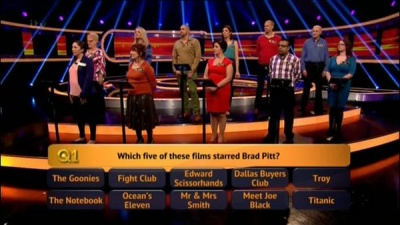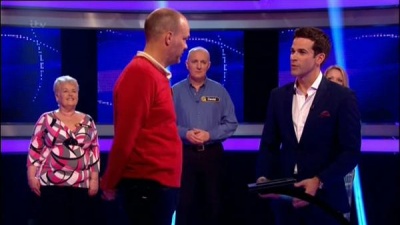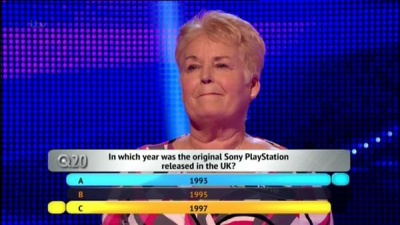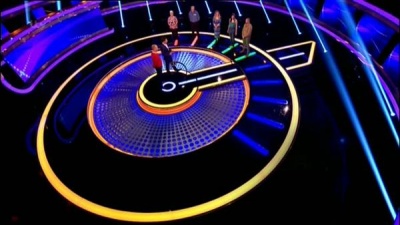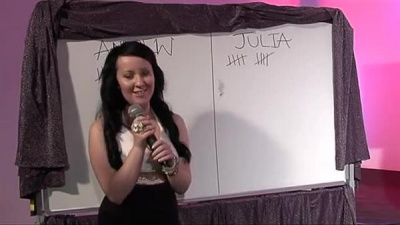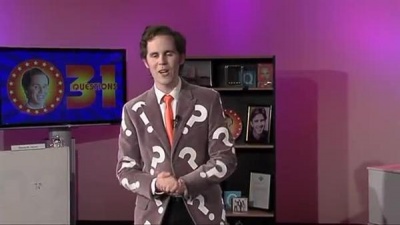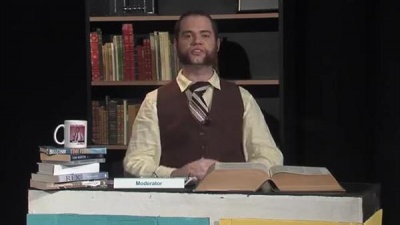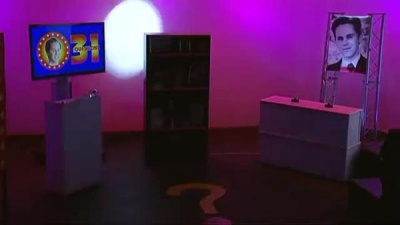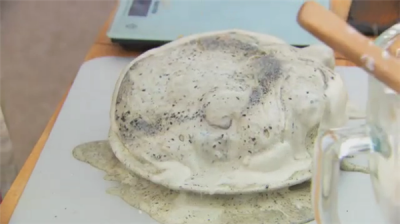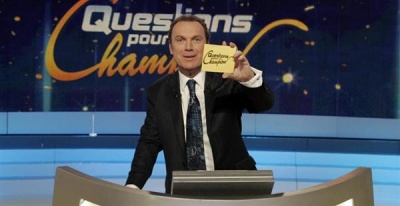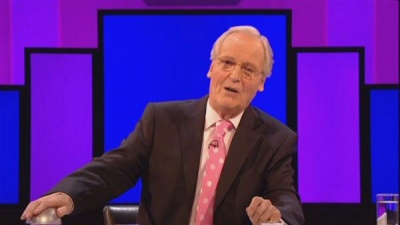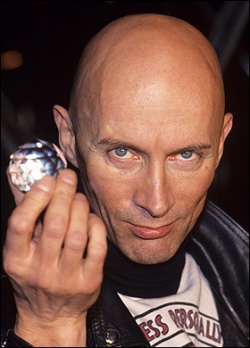Weaver's Week 2014-08-31
Last Week | Weaver's Week Index | Next Week
A count of questions this week; later, we're looking at a crowdfunded show from Australia, and wondering what they're drinking at RTÉ Towers. Can we have a pint? We'll just get something from the freezer...
Contents |
The 21st Question
Chocolate Media for ITV, 4 — 15 August
This isn't to be confused with 21 Questions Wrong, the erstwhile insert into The Fifty-50 Show. Nor is it to be confused with 20 Questions Wrong, the occasional segment of the Edinburgh Nights programme. The 21st Question is a completely different game.
There are reasons why ITV takes The Chase off for a couple of months each year. One is to allow the format to rest: when it returns next week, viewers will welcome the programme anew. Another reason is to try other ideas: Tipping Point began as a Chase replacement, and has grown into a proper hit programme on its own. Perhaps another is to make The Chase look good, by airing worse shows.
The first of this year's summer replacements was The 21st Question. It's a quiz hosted by Gethin Jones, who has done a lot of light entertainment. The only trouble is that he's been overshadowed through his career. Losing finalist on Strictly Come Dancing. Holding Out for a Hero, a feelgood show that wasn't Big Star's Little Star. Even his Blue Peter highlight (not quite completing the Marines' eight-hour yomp) has been eclipsed by his successor Helen Skelton.
Good news for Gethin's career: he's hosting the better of the replacement series.
The 21st Question begins with eleven people standing at a bank of lecterns. They're going to race to give the five correct answers to a question, such as "Which five of these films starred Brad Pitt?" Five answers are right, five are wrong. The fastest player to complete the answers gets first choice of where to start: positions 1 through 10, or the Power Spot. Second-fastest gets to choose from what's left, and so on until the last player is (inevitably) stuck with position 10. We'll get into the tactics of this choice later.
So, after that brief introduction, the main body of the game begins. One player has elected to be on the Power Spot, the others stand in order around the edge of a circle. The players around the edge will face the central player in a series of duels. The duel is multiple choice questions.
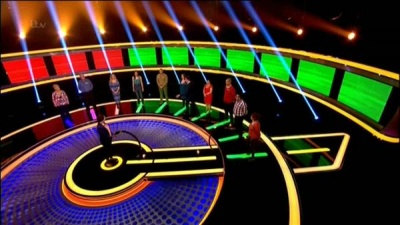 Not quite two-thirds of the Fifteen-to-One set.
Not quite two-thirds of the Fifteen-to-One set.
The duel is won by whoever gives a right answer when their opponent is wrong. To take the Power Spot, the power player needs to make an error, and the player on the edge needs to be right. The duel ends early if the power player wins a question. When the players can't be split after three questions, the power player wins by default.
The net result is that the power player has a sizeable advantage. If they can get the next nineteen questions right, they will win, and win very big. But the power player is not invulnerable, they could leave the game at any time.
The power player also gets to pick subjects: the producers have a list of 10 subjects. They're the usual daytime quiz staples – "sport", "food and drink", "technology" – and today's 10 come from about 15 possibilities. Pick a subject, and question 2 begins. Usually followed quickly by question 3, with question 4 hot on its heels.
We say "quickly". We don't always mean it. Gethin uses every trick in the book to prolong the game: "she said X, the correct answer's Y, you need to have said Y to knock him out." Or, "and I can reveal that you've given different answers", before revealing the different answers. And then the right answer. Maybe after a commercial break.
To be fair, this column found the speed slow but acceptable. We didn't get the impression that Gethin was ever stalling the game. It's never going to be as quick-fire as The Chase (their 21st question is usually in the second Cashbuilder). Nor was it as padded as the first half of Fifteen-to-One. Gethin built up the tension, and rarely took it too far. We never felt that the show had stopped: there was always something moving, always some sort of forward progression.
We must also note that this column is in the minority, many other commentators found the programme to be too slow and ponderous.
Eventually, one of the players will be knocked out. When this happens, the set shows off its gimmick. There's a path leading from the Power Player to the current player on the edge. The current player changes, and the path rotates to the new player, as does a backdrop behind the Power Spot. A nifty gimmick.
For the power player, only right answers will put cash into the day's pot. £100 for each question in the first duel, £200 in the second, £300 in the third, and so on. There's nothing for a wrong answer. The power player may double up from question 7. This doubles the value of each question, and "doubles the difficulty". Rather than "easy – medium – hard", the questions become "hard – very hard – super duper hard". Challengers may double from question 14. It's not possible to double-double, this is an ITV teatime quiz and not Only Connect.
Also, there are only 19 questions in the main body of the game. With a maximum of three per player, it's clear that position 7 on the circle is the last one assured of playing. They may only get one question, but will usually have three. At least two duels need to finish early for position 8 to play, and it's rare for 9 and 10 to enter the game. This informs the tactics in the first question – most winners will choose position 7, then places 6, 5, and 8 will fill before the Power Spot. It's usually thought better to take an early slot than position 9.
Players come back throughout the week: everyone defeated on Monday will be back on Tuesday, and most of them will remain until Friday. This allows little narratives to develop through the week. Will Sophia ever get a sports question right? Will the audience root for newlywed Jo? Will Dan admit to membership of the Phil Tyme fan club?
By the end, ten are eliminated, one player remains on the Power Spot. They play the titular 21st Question, somewhere in the space between Topranko! and Who Dares Wins.
Q21 is a list question, looking for answers from the top ten in a certain category. For instance, "the ten longest-serving British prime ministers whose first term began in the 20th century". Gethin first asks for three answers. Providing these will win half of the day's prize fund, usually around £2000. If the player wishes, they can stop there and take the money. Or they can play on, and give two more answers to double the winnings. Again, the player can stop. Or they can play on, and one right answer will double their winnings to around £8000. But an incorrect answer at any stage means the player leaves with nothing.
It's a nice final round, the risk and the reward are balanced. A cautious player will usually go with something, a reckless player will often leave empty-handed. On some episodes, the producers failed to allow enough time for Gethin to confirm the full list, and that's sloppy ("an unfinished list is unfinished business").
Overall, we like The 21st Question. It's friendly, it's less frantic than The Chase, and the best bits are at the end. But, if a viewer doesn't like that week's players, they may as well turn off for the week. And "less frantic" can translate into "unbearably slow", particularly near the start of the programme.
31 Questions
RMITV Student Television for C31 Melbourne & Geelong, 9 June 2012 – 21 July 2014
Some shows are bankrolled by big media corporations. The 21st Question is made by Chocolate Media, an offshoot of NBC Universal. Other shows are funded by the audience. Theatre productions, art installations, 31 Questions.
Originally made for student television in Melbourne, 31 Questions prides itself on being cheap. "Low budget television at its most adequate." It makes a virtue of being unpopular. "The game show all the cool kids are ignoring." It emphasises its originality. "The quiz show like most of the others."
The programme is somewhat better than that. It works on two levels: it's a straightforward and reasonably straight quiz, and it's a very surreal comedy world.
The quiz comprises six rounds, beginning and ending with general knowledge posers on the buzzer. There's also Word On the Street (footage of people describing something) and The One Where They Quote The Movies (the 31 Questions Rep re-enacts scenes from motion pictures). The first two series had When Was That, a series of clues leading to one year. It was replaced this year by Slow Draw, marker-on-pad with the wrong hand.
Each show includes a special round, never seen before or since. These are sometimes comedy skits, more often genuine stunts that don't bear repetition. They help 31 Questions establish its comedy credentials, and that's crucial to its success.
The moment-to-moment comedy is reasonable, there are some cracking one-liners. David M Green looks an awful lot like the Mike Flex character from KYTV, particularly in his over-the-top question mark jacket, and that set our expectations too high.
Anthony McCormack is the programme's "moderator", playing a character who knows the rules and will make sure everyone enforces them. David and Anthony have back-and-forth banter, it reminds us of Xander and Richard from another Pointless programme. Sophie Loughran is the show's scorer, at first putting up scores on a flipchart, later getting electronic displays. She's never allowed a lapel microphone, or to finish singing her songs.
But the main comedy is a visual gag, never spoken or even acknowledged. 31 Questions is set in an alternate universe, where David M Green is a face anyone can identify on sight. His face is everywhere. On the title cards, on the set, on the moderator's desk. The cult of David M Green goes right through 31 Questions.
Funding for 31 Questions came from the audience. Not in the sense of "pay for the privilege of seeing this show", but in the sense of crowdfunding. Viewers in Australia, and around the world, sent donations to help make the series. They got their name in the credits, and the sweet satisfaction of knowing they did their bit for low-quality television.
31 Questions also gets money from "community" television channels, which broadcast niche programmes for small, local audiences. These channels buy programmes for small amounts of money. The UK hasn't had this model of local programmes for local people, everything has to be on a national scale. The budget for a series of 31 Questions is about £1000 an hour, we don't know the budgets for shows on Mustard TV or Notts TV.
It's an entertaining way of spending 30 minutes. We applaud David and the others for closing the show after three years, before it can get stale.
Conspiracy Theory of the Week
"So a blowtorch was used to melt it, you're implying?"
The Great British Bake Off had this week's hugemungous social media storm. One challenge on the episode was Baked Alaska puddings, which involve ice cream. The episode was filmed during the peak of the summer heat. One contestant removed another's ice cream from the freezer. The other contestant believed his work had been ruined, and threw it all in the bin. He left the show for presenting nothing.
The social media storm was massive, with animated GIFs and mash-up videos and "comedy" errors. The contestant who had emptied her freezer, and left the ice cream out for less than a minute, suggested she had been "stitched up" by the editing. We'll find out in the next programme that she's leaving the contest for medical reasons. Some wanted the producers to borrow a time machine to go back to late spring and reinstate the ousted contestant. These people appear to have their hit BBC shows mixed up.
The editing appears to mislead the viewer, but the editing is a) consistent with established Bake Off style and b) not blatantly inaccurate. Was this done to create false drama, as some have charged? Was it done to "frame" Diana, as others allege? Or was it that the viewers are so used to manipulation by shows such as Big Brother, that they see fakery everywhere?
We don't believe that bleating to OFCOM will help anything, and the fact that 800 people have done so might be evidence of something. We don't believe in throwing blame about, though it appears the whole contretemps would not have happened if the producers had enough freezers. We don't believe we're in possession of all the facts, and unless the unedited rushes are published, we never will be.
This Week and Next
We were surprised to read RTÉ's statement that "Winning Streak is Europe's longest-running TV gameshow". Mostly because it's a complete load of cobblers. Our definition of game show is broad enough to include the Eurovision Song Contest, and that regular programme (established 1956) classes itself as a game show. Winning Streak began in 1990, when Countdown was almost eight years old, A Question of Sport was 20, and Have I Got News for You was one week away from launch.
If RTÉ is being pedantic, it could argue that none of these are "classic" game shows in a narrow definition. We'd like to see their objection to Questions Pour un Champion, going for gold in France every blimmin' day since 7 November 1988. We contend that Julian Lepers has a greater claim to host Europe's longest-running TV game show. And we've not looked at evidence beyond the UK and France.
University Challenge pitted two unusual teams against each other. Two colleges of the University of London, two teams of mature students (average ages in the high 20s), and with as many people from abroad as from the UK (three Canadians and one Brazilian).
London School of Hygiene and Tropical Medicine were represented by Andy Taylor, Rebecca Glover, Sarah Legrand, Anjaneya Bapat. LSE sent Peter Sims, Jeffrey Mo, Jimmy Chen, Pedro Franco de Campos Pinto. The latter institution was once known as London School of Economics, but then they decided the letters were just squiggles on a page and had no meaning. Bit like economics, really.
LSHTM had the better start, getting the first three starters and a 50-0 lead. They also managed to get the first visual round, which (apparently) is opera in the style of emoticons. The writers of Britain's Brightest must be turning in their beds. LSE proved strong on women in technology, it helped them to cut the gap to ten points. LSE took the lead; as seems typical, it was from the third bonus after dropping the first two.
But two correct answers and LSHTM had the lead. And a set of bonuses on asexual reproduction in fungi. Viewers tuning in for the Scottish independence debate might have expected something more accessible. "What word is formed by concatenating silent letters" asked one starter. Surely the correct answer was " ". It's silent.
After that mid-game wobble, LSHTM held a 35-point lead with a couple of minutes left. LSE took a starter on the foundation of The Economist "newspaper", and scored five on quotations from Hamlet. Another starter for the LSE, but paleo-anthropology proved a step too far. LSHTM won the game, 150-140.
Comeback of the week: Blind Date. A new series of the dating show is to appear on televisions. But only televisions in Ireland, as the commission is for TV3.
Eurovision news. The association of broadcasters is unsure what's going on at NERIT. Changes were made to the Greek broadcaster's supervisory board, and they appear to threaten independence from the government. NERIT was formed earlier this year, after the Greek government interfered in ERT by abolishing it.
Confirmation in this week's Mastermind that the specialist subject rounds *are* shorter than last year. Without any special effort, contenders this week managed 16 questions, two more than the usual allocation in the 2013-14 series.
Susan Sworn made a special effort, squeezed in an extra question, and achieved a perfect round and a remarkable 17 (0) score on Richard the Lionheart. She seemed surprised by some of the early general knowledge questions: could it be that simple? Perhaps not: a run of passes followed, and points came rarely. The final score was 25 (3).
The other players were in touch throughout. Les Morrell (The Late Great Bobby Moore, as Humpo described him) reached 15 (1). His second round went well for the first half, but then he fails to answer a question on the career of Nicholas Parsons, and it all fell apart to 24 (2). But it's the contribution that matters, the score is immaterial.
Except it's not. Jeremy Renals made 14 (0) on short stories of Edgar Allan Poe, progressing to 25 (3) after general knowledge. Chris Grandison (Our Friends In the North) also made 15 (1) on his specialist subject. His general knowledge round contained a late question about Richard O'Brien. It didn't win him a point, but did win a come back next time crystal, on 26 (1).
BARB ratings in the week to 17 August:
- More cake, please! The Great British Bake Off remains the most-seen show in the UK, 8.8m saw the second episode.
- Tumble (3.55m) and Pointless Celebrities (3.45m) are the next biggest game shows. Tipping Point Lucky Stars (2.95m) and Dragons Den (2.9m) are close behind.
- Come On Down! The Game Show Story was seen by 2.1m. There were 1.75m viewers for Big Brother, and just 870,000 for The Singer Takes It All.
- Top shows on the new channels were Got to Dance (590,000 on KYTV Europe UK), Hell's Kitchen (510,000 on ITV2), a repeated Buzz and Tell (405,000 on Cbeebies).
- 31 Questions got about 24,000 viewers across Australia. That's level with Mastermind Cymru 2006 on S4C, and about par for programmes on Challenge +1.
Next week. The Chase returns to daytimes (ITV, 5pm weekdays), as does Pressure Pad (BBC1, 2.15). Tipping Point moves to 3pm, making way for Who's Doing the Dishes? (ITV, 4pm). And there are new runs of Cog1nio (S4C, 5.30 Tue) and Wordaholics (Radio 4, 11.30am Wed).
Saturday night. Pointless Celebrities (BBC1, 4.50) asks The Five Star Question. Tumble (BBC1, 6pm) allows any remaining viewers to vote (but the one remaining viewer we know turned off after last night's elimination). In It to Win It returns (BBC1, 8.20). ITV has embargoed the celebs on The Chase (7pm) and Through the Keyhole (9.20), so our clue is: no monkey, no likely.
Only Connect returns, this time on BBC2 (8.30 Mon). There are a few changes for the more mainstream channel: Victoria Coren has given up the drinking, questions are indicated by emoticons rather than hieroglyphs, and if you thought the sequences wall in the quarter-final was tough, wait till you hear what's in the final. Ba-bing!
Photo credits: Chocolate Media, RMITV, Love Films, Fremantle Media, BBC, Chatsworth Productions. We may be joshing about Only Connect. Or are we?
To have Weaver's Week emailed to you on publication day, receive our exclusive TV roundup of the game shows in the week ahead, and chat to other ukgameshows.com readers, sign up to our Yahoo! Group.


